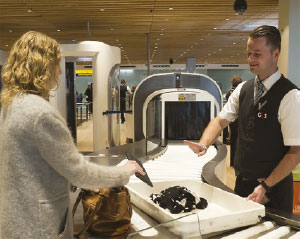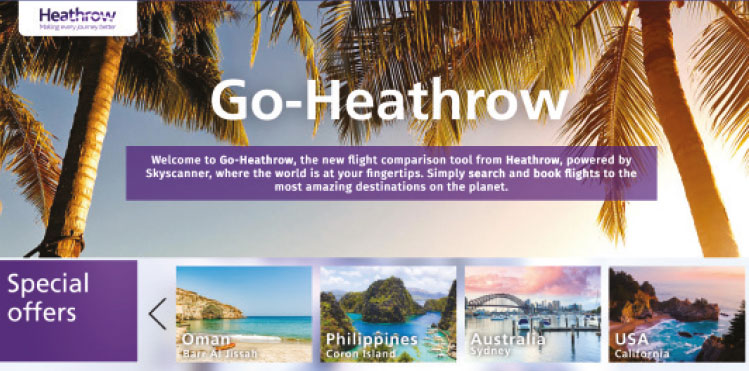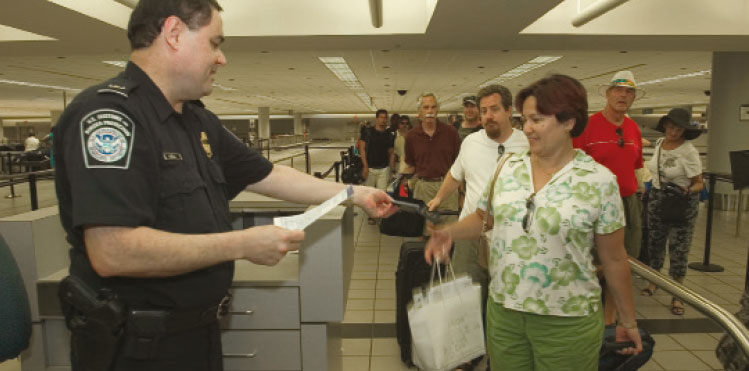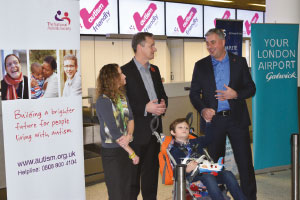Ryan Ghee explores how a US preclearance agreement, a Facebook flight search tool and 3D hand baggage scanners are contributing to improvements to passenger experiences across Europe’s airports.
Schiphol and KLM trialling 3D hand baggage scanners at AMS

If the trial of the 3D scanners proves to be successful, the technology could be rolled out across all security lanes at Amsterdam Airport Schiphol.
Amsterdam Airport Schiphol, the National Coordinator for Security and Counterterrorism and KLM are working together to test new scanning devices for hand baggage, which allow passengers to leave their liquids and laptops in their bags.
The 3D scanning devices enable security staff to explore highly detailed 3D, 360-degree images of the baggage contents on a screen. The pilot project is taking place in two security lanes – one in Departure Hall 3 and one in Transfer Filter E/F.
Passengers will still have to put their liquids and gels in a resealable plastic bag and the 100ml limit per item will remain in place, but they will be able to leave the plastic bag in their hand luggage.
As well as testing the viability of the technology, the pilot will explore whether the implementation of the 3D scanners can help to make the security process faster for passengers. If the trials prove to be a success, Schiphol will install the hand baggage scanning devices in all 67 security lanes across the airport.
Schiphol says it is “working continuously to improve the security process, with the aim of making the security check more pleasant and more comfortable for passengers and ensuring a safe and efficient security process at the airport”.
Heathrow introduces Facebook flight search tool

The launch of the ‘Go Heathrow’ Facebook tool marks the first time Heathrow has directly supported its airline partners with ticket sales.
Heathrow Airport has launched a Facebook tool called ‘Go Heathrow’, which can be used to search for the best deal when flying from the London hub. The new tool, which has been developed in partnership with Skyscanner, sits within Heathrow’s Facebook platform and allows Facebook users to search and book flights directly from the social media page. This marks the first time Heathrow has directly supported its airline partners with ticket sales.
Heathrow’s Head of Passenger Communications, Marc Ellams, said: “We are excited to be launching this new technology which gives Heathrow passengers a useful and innovative tool for getting the best fares and journey plan that suits their individual needs. This new technology aims to make planning the next adventure as simple as possible, bringing the world to our customer’s fingertips.”
Skyscanner’s Senior Commercial Manager, Mike Ferguson, added: “This is the first time Skyscanner has partnered with an airport to build a travel search tool within their own social media profile, and I believe this inventive travel search mechanism represents an exciting new way for travellers to engage with Heathrow and find their next holiday all within their Facebook feed.”
Agreement paves the way for US preclearance at Stockholm Arlanda Airport

US preclearance allows passengers to complete the immigration, customs and agriculture inspection by US CBP before boarding a flight to the United States.
The governments of Sweden and the United States have signed a bilateral agreement to introduce US border control at Stockholm Arlanda Airport, which paves the way for US-bound passengers to make use of the US preclearance service. Airport operator Swedavia and US Customs and Border Protection (CBP) have also signed an agreement on how preclearance will be handled at the airport.
At present, Dublin and Shannon airports are the only airports in Europe to offer US preclearance, which allows passengers to complete the immigration, customs and agriculture inspection by US CBP before boarding flights to the United States. As a result of the latest agreement between the US and Sweden, a preclearance facility can be built as soon as the legal process is completed to modify US preclearance to comply with Swedish laws. Swedavia will now proceed to the next preparatory phase of completing the project design and preparing a public tender for the coming facility.
Karl Wistrand, President and CEO, Swedavia, said: “The US is Sweden’s most important trading partner after Britain. It feels really good now that the agreement with CBP has been signed. As we await a decision from the Swedish parliament, we will continue our preparatory work so that a decision on a larger investment in US preclearance facilities can be taken immediately once the legal process is completed, which is expected in the summer of 2018.”
Gatwick becomes UK’s first Autism Friendly airport

Gatwick Airport Chief Executive Stewart Wingate has confirmed that the airport will introduce so-called Autism Champions to help with the ongoing training of frontline staff.
Gatwick Airport has been recognised by The National Autistic Society as the UK’s first Autism Friendly airport. The award recognises the successful efforts of Gatwick and OCS, its assistance provider, to meet a range of Autism Friendly criteria, which will help to make the airport experience more accessible for autistic travellers.
To satisfy the criteria, Gatwick Airport had to ensure that clear and accessible information is available for autistic passengers about the airport and the assistance available to help them plan and prepare for their journey. It also had to display a commitment to staff training so that staff are better able to assist autistic passengers. Initiatives such as the hidden disability lanyard have also been rolled out, to help staff discreetly recognise which passengers may need additional assistance.
Stewart Wingate, Gatwick Airport Chief Executive, said: “We recognise airports can sometimes be a stressful environment for autistic passengers, but that simple steps can go a long way in helping to break down barriers and make it easier for autistic passengers and their families or caregivers to travel through Gatwick.
“This award is recognition of the fantastic efforts of many of our staff, volunteers and valued partners like the National Autistic Society, and signifies our ongoing commitment to ensuring Gatwick is an accessible and welcoming environment for the 42 million passengers who use the airport every year.”







